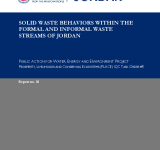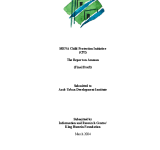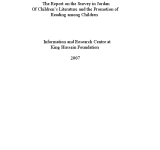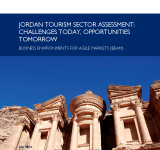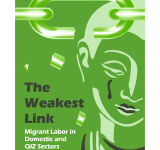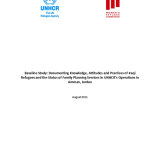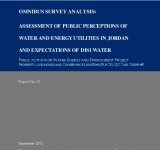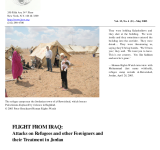The report studies the formal and informal waste streams in Jordan as well as the public behaviors and attitudes that influence them. The study gives a specific emphasis to discovering the “drivers” of these practices as well as barriers to change and aims to locate examples of model behavior that already exists in Jordan so that they can be encouraged and duplicated. It investigates and assesses the four areas – the general attitudes of the Jordanian population towards waste and waste disposal;; informal waste reclamation sector in Jordan;; stream of recyclable material and the formal sanitation and waste management system of Amman and Aqaba. This research was conducted as part of the Public Action for Water;; Energy and Environment Project (PAP);; which aims to encourage water and energy conservation and to support behavior change towards more conservation and efficient practices both at the household level and in the commercial;; industrial and civil society arenas using social marketing behavioral methods. The study finds that there were high levels of awareness and concern about issues such as littering and recycling but it also concludes that the lack of concern amongst the broader public was cited as one principal reasons that people were not taking action. It calls for a quantitative research to confirm Jordanian attitudes on environmental issues.
Amman
This report aims to review the status of children in Greater Amman and to conduct a capacity assessment of key institutions addressing children’s issues. Various issues are examined;; covering areas such as health;; education;; and socio-economic characteristics. This report also reviews the status of disadvantaged children;; including working children;; orphans;; refugees;; and children with disabilities;; in order to identify vulnerabilities and risk factors specific to them. Finally;; this report assesses the capacity of selected institutions addressing children’s issues in Greater Amman and proposes phased capacity building programs based on the findings of the assessment.
This report examines social development in Jordan with respect to childhood education and literacy. The survey presented examines the status of children’s literature and encouraging reading in Jordan. The report assesses the promotion of children’s literature in Jordan through various axes;; including the quality and prevalence of libraries;; the effectiveness of policies;; and the existence of civil institutions active in the field of children’s literature. The report also identifies various trends with respect to children’s literature through concentrated discussion groups with families;; teachers;; children;; and writers of children’s literature.
The tourism sector assessment report examines critical questions related to Jordan's best opportunity areas for tourism development growth that will result in increasing tourism receipts;; private-sector investment in tourism;; and tourism-related employment. The report identifies global trends;; best practices;; and benchmarks shaping tourism demand and competitiveness. It also suggests approaches for expanding tourism in key Jordan governorates and secondary destination in ways that benefit local communities. According to the assessment;; Jordan is well-positioned to move from a regional;; multi-country tourist destination to a stand-alone destination with a portfolio of tourism products with year-round appeal for foreign and domestic visitors;; and this will require a long-term commitment from both public and private stakeholders. It suggests collaboration between Jordan's government and private sector;; localized and inclusive economic development implementation strategies and increase in the supply of skilled tourism workforce professionals.
This report is the second annual report of Tamkeen Center for Legal Aid and Human Rights. It addresses the status of both migrant domestic workers and migrant workers in Qualified Industrial Zones because these two categories are subject to recurrent abuses and are the most vulnerable group due to legislative reasons;; administrative practices and the actions of their employers.
This report addresses a family planning (FP) study undertaken by the United Nations High Commissioner (UNHCR);; the Women's Refugee Commission (WRC) and the Centers for Disease Control and Prevention (CDC) among Iraqi refugees in Amman;; Jordan in June-July;; 2011. It documents the knowledge;; beliefs;; perceptions and practices of refugees;; as well as the state of service provision to improve programming and subsequently increase uptake of good quality FP services among Iraqi women;; men and adolescents.
The report aims to determine public attitudes towards water and energy utilities and assess public perception of Disi water;; scheduled to begin serving Amman residents in 2012. It is based on an omnibus survey;; structured;; quantitative and in-person interviews with 1000 respondents representing adult males and females across the twelve governorates of Jordan. This research is part of the was conducted as part of the Public Action in Water;; Energy;; and Environmental Project to initiate and establish clear and identifiable behavioral changes amongst the Jordanian public and decision-makers;; to lead to increased efficiency in the use of water and energy;; and to improve solid waste handling practices. The findings of the survey show that while a majority of respondents could correctly identify their water provider;; nearly a quarter could not and more than half of the respondents believe they are paying water rates that are unreasonable for the quality of water service they receive. The report confirm that the customer experience with both water and electrical utility companies can be improved and increasing awareness of the sound quality of the Disi water would support the public perceptions to continue to shift in a positive direction.
Attacks and harassment amidst the security vacuum in Iraq forced refugees and other foreigners to flee the country and become refugees again;; this time in Jordan. Based on research in Baghdad and Jordan;; this 22-page Human Rights Watch report details the abuses against refugees and foreigners in Iraq;; as well as their treatment upon arrival in Jordan. Housing is frequently the pretext for the violence and harassment. Many landlords;; forced by the previous government to take Palestinian tenants at discounted rates;; are taking advantage of the breakdown in law and order to evict Palestinian tenants from their homes or to extort unrealistic rent increases from them. In other cases;; violence and threats have come from individuals who seem to have no legitimate claim to the property. Human Rights Watch criticized Jordanian authorities for limiting refugees' entry to Jordan and recommended that Jordan provide immediate protection and assistance to all refugees;; including those currently trapped near the Jordanian border in accordance with international refugee law standards.
